Edie Melson's Blog, page 365
September 24, 2015
the Writer & the Green-eyed Monster
by Henry McLaughlin @RiverBendSagas
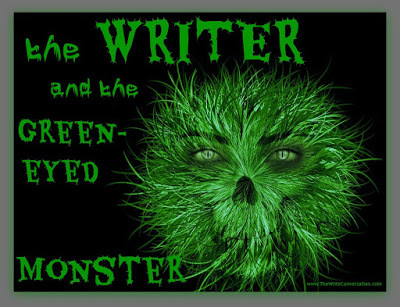 All writers need to beware the Green-eyed Monster.Here I am a born-again Christian, a published author, full-time writer, writing coach and group leader, speaker and teacher at writer’s conferences. I can look you in the eye and say, with all sincerity, I am living my dream. The dream God gave me.
All writers need to beware the Green-eyed Monster.Here I am a born-again Christian, a published author, full-time writer, writing coach and group leader, speaker and teacher at writer’s conferences. I can look you in the eye and say, with all sincerity, I am living my dream. The dream God gave me.
And yet, there are times—way too many times—when jealousy and envy clench my heart. I’m scheduled to teach one class at a writer’s conference and hear a fellow writer will be teaching two. Why her and not me? I’m published and she’s not.
I’m working to get my second book published and I hear where someone has signed a three-year contract for nine books. To quote Charlie Brown, “AAUGH!”I find myself ankle deep in the pond of self-pity, about to take the next step which will plunge me up to my nose. And the water is thick, pulling me deeper.
 God's voice can refocus us away from jealousy.And then, I hear a voice. Not always audible but deep inside and loud enough to grab me by the hairs on the back of my neck and lift. “Had enough of the pity party yet?” It’s amazing how many times I want to say, “No, not yet,” even as the gunk is seeping into my nose.
God's voice can refocus us away from jealousy.And then, I hear a voice. Not always audible but deep inside and loud enough to grab me by the hairs on the back of my neck and lift. “Had enough of the pity party yet?” It’s amazing how many times I want to say, “No, not yet,” even as the gunk is seeping into my nose.
He pulls me out anyway and we walk and talk. And He reminds me of His plan for me, for my life, for my writing. The only thing I should compare myself to is that plan. Am I doing what He led me to do? Whenever I compare myself to someone else, I will always be left with the short end of the stick. I will always see them as better, more successful and myself as the loser.
My peace, my satisfaction comes from doing what He wants. My path is different from anyone else’s. He has gifted me in ways different from others. His gifts enable me to be me and to minister to others in unique ways. And He has blessed me beyond anything I can dream or imagine.
My peace comes from trusting Him. I am where He wants me to be, doing what He wants me to do, serving those He wants me to serve.
How have you handled the attacks of the green-eyed monster?
TWEETABLESThe Writer & the Green-eyed Monster - Henry McLaughlin @RiverBendSagas (Click to Tweet)
My #peace come from following God & my path is different from other writers - @RiverBendSagas (Click to Tweet)
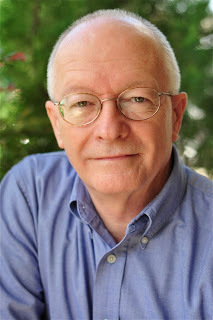 Henry’s debut novel, Journey to Riverbend, won the 2009 Operation First Novel contest.
Henry’s debut novel, Journey to Riverbend, won the 2009 Operation First Novel contest.
He serves as Associate Director of North Texas Christian Writers.
Henry edits novels, leads critique groups, and teaches at conferences and workshops. He enjoys mentoring and coaching individual writers.
Connect with Henry on his blog, Twitter and Facebook.
 All writers need to beware the Green-eyed Monster.Here I am a born-again Christian, a published author, full-time writer, writing coach and group leader, speaker and teacher at writer’s conferences. I can look you in the eye and say, with all sincerity, I am living my dream. The dream God gave me.
All writers need to beware the Green-eyed Monster.Here I am a born-again Christian, a published author, full-time writer, writing coach and group leader, speaker and teacher at writer’s conferences. I can look you in the eye and say, with all sincerity, I am living my dream. The dream God gave me.And yet, there are times—way too many times—when jealousy and envy clench my heart. I’m scheduled to teach one class at a writer’s conference and hear a fellow writer will be teaching two. Why her and not me? I’m published and she’s not.
I’m working to get my second book published and I hear where someone has signed a three-year contract for nine books. To quote Charlie Brown, “AAUGH!”I find myself ankle deep in the pond of self-pity, about to take the next step which will plunge me up to my nose. And the water is thick, pulling me deeper.
 God's voice can refocus us away from jealousy.And then, I hear a voice. Not always audible but deep inside and loud enough to grab me by the hairs on the back of my neck and lift. “Had enough of the pity party yet?” It’s amazing how many times I want to say, “No, not yet,” even as the gunk is seeping into my nose.
God's voice can refocus us away from jealousy.And then, I hear a voice. Not always audible but deep inside and loud enough to grab me by the hairs on the back of my neck and lift. “Had enough of the pity party yet?” It’s amazing how many times I want to say, “No, not yet,” even as the gunk is seeping into my nose.He pulls me out anyway and we walk and talk. And He reminds me of His plan for me, for my life, for my writing. The only thing I should compare myself to is that plan. Am I doing what He led me to do? Whenever I compare myself to someone else, I will always be left with the short end of the stick. I will always see them as better, more successful and myself as the loser.
My peace, my satisfaction comes from doing what He wants. My path is different from anyone else’s. He has gifted me in ways different from others. His gifts enable me to be me and to minister to others in unique ways. And He has blessed me beyond anything I can dream or imagine.
My peace comes from trusting Him. I am where He wants me to be, doing what He wants me to do, serving those He wants me to serve.
How have you handled the attacks of the green-eyed monster?
TWEETABLESThe Writer & the Green-eyed Monster - Henry McLaughlin @RiverBendSagas (Click to Tweet)
My #peace come from following God & my path is different from other writers - @RiverBendSagas (Click to Tweet)
 Henry’s debut novel, Journey to Riverbend, won the 2009 Operation First Novel contest.
Henry’s debut novel, Journey to Riverbend, won the 2009 Operation First Novel contest. He serves as Associate Director of North Texas Christian Writers.
Henry edits novels, leads critique groups, and teaches at conferences and workshops. He enjoys mentoring and coaching individual writers.
Connect with Henry on his blog, Twitter and Facebook.
Published on September 24, 2015 01:00
September 23, 2015
Tried and True Ways to Attract Readers
by DiAnn Mills @DiAnnMills
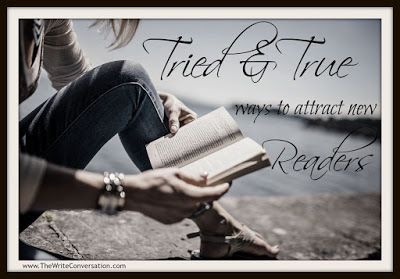 We writers can become so involved with our stories that we forget we’re writing for readers—not agents, editors, marketing and promotion types, or sales staff.
We writers can become so involved with our stories that we forget we’re writing for readers—not agents, editors, marketing and promotion types, or sales staff.
Entertainment is our aim,And writing is our game.
There are 7.2 billion people in this world. We will never meet each person, but we have the opportunity to contact them and make a friend from anywhere. How amazing to reach others with a well written story—to give and not to take. That’s a challenge, and one I welcome.
Where does a writer find sound ways to bring people under the umbrella of a reader . . . and a friend?A writer has to know why she is writing. Is it to satisfy a longing to create through words? To teach? Is it to relay deep moral truths through a powerful truth and realistic characters? Is it to entertain through vibrant and colorful characters? Is it to attempt what you’ve never done before? Or is it a combination of many things? A writer can’t touch a reader unless she has an understanding of why she’s driven to communicate through the written word. What is the writer's genre or focus?What is the writer’s genre or focus? Knowing what to express opens the door to creating a powerful novel and finding readers who enjoy that type of story.A quality writer uses easy to read language that doesn’t distract the reader by sending them to the dictionary.An informed writer understands the value of sensory expression to place the reader into the reading experience.
What is the writer's genre or focus?What is the writer’s genre or focus? Knowing what to express opens the door to creating a powerful novel and finding readers who enjoy that type of story.A quality writer uses easy to read language that doesn’t distract the reader by sending them to the dictionary.An informed writer understands the value of sensory expression to place the reader into the reading experience.
 A serious writer dives into social media & all it has to offer.A serious writer dives into social media and all it has to offer. Readers fall into various demographics according to age, culture, goals, wants, needs, gender, and personal preferences. Find the venue that best suits your style and type of writing. Use images that reflect you and your unique voice.Where do readers dine, shop, vacation, and live? How can you appeal to them through their day to day activities? Step out from behind your computer and touch lives through your vibrant personality.A mentally healthy writer believes transparency is vital. Be who you are, real and caring.A writer considers speaking for promotion, but only if it’s something she is equipped and called to do. A speaker who believes in her message engages others to believe in her.A writer reads not only in her genre or preference but also about the community and world around her.Word of mouth is still the best way to reach others. Every friend who shares a writer’s mission will tell others.
A serious writer dives into social media & all it has to offer.A serious writer dives into social media and all it has to offer. Readers fall into various demographics according to age, culture, goals, wants, needs, gender, and personal preferences. Find the venue that best suits your style and type of writing. Use images that reflect you and your unique voice.Where do readers dine, shop, vacation, and live? How can you appeal to them through their day to day activities? Step out from behind your computer and touch lives through your vibrant personality.A mentally healthy writer believes transparency is vital. Be who you are, real and caring.A writer considers speaking for promotion, but only if it’s something she is equipped and called to do. A speaker who believes in her message engages others to believe in her.A writer reads not only in her genre or preference but also about the community and world around her.Word of mouth is still the best way to reach others. Every friend who shares a writer’s mission will tell others.
Do you want to make a positive impact on mankind? Your gift of writing can touch a few or thousands. Make the effort to reach others with your special message.
TWEETABLES
Tried & True Ways to Attract Readers - via @DiAnnMills on @EdieMelson (Click to Tweet)
Entertainment is our aim & #Writing is Our Game - @DiAnnMills on @EdieMelson (Click to Tweet)
 DiAnn Mills is a bestselling author who believes her readers should expect an adventure. She combines unforgettable characters with unpredictable plots to create action-packed, suspense-filled novels.
DiAnn Mills is a bestselling author who believes her readers should expect an adventure. She combines unforgettable characters with unpredictable plots to create action-packed, suspense-filled novels.
Her titles have appeared on the CBA and ECPA bestseller lists; won two Christy Awards; and been finalists for the RITA, Daphne Du Maurier, Inspirational Readers’ Choice, and Carol award contests. Library Journal presented her with a Best Books 2014: Genre Fiction award in the Christian Fiction category for Firewall.
DiAnn is a founding board member of the American Christian Fiction Writers; the 2015 president of the Romance Writers of America’s Faith, Hope, & Love chapter; a member of Advanced Writers and Speakers Association, and International Thriller Writers. She speaks to various groups and teaches writing workshops around the country. She and her husband live in sunny Houston, Texas.
DiAnn is very active online and would love to connect with readers on any of the social media platforms listed at www.diannmills.com.
 We writers can become so involved with our stories that we forget we’re writing for readers—not agents, editors, marketing and promotion types, or sales staff.
We writers can become so involved with our stories that we forget we’re writing for readers—not agents, editors, marketing and promotion types, or sales staff. Entertainment is our aim,And writing is our game.
There are 7.2 billion people in this world. We will never meet each person, but we have the opportunity to contact them and make a friend from anywhere. How amazing to reach others with a well written story—to give and not to take. That’s a challenge, and one I welcome.
Where does a writer find sound ways to bring people under the umbrella of a reader . . . and a friend?A writer has to know why she is writing. Is it to satisfy a longing to create through words? To teach? Is it to relay deep moral truths through a powerful truth and realistic characters? Is it to entertain through vibrant and colorful characters? Is it to attempt what you’ve never done before? Or is it a combination of many things? A writer can’t touch a reader unless she has an understanding of why she’s driven to communicate through the written word.
 What is the writer's genre or focus?What is the writer’s genre or focus? Knowing what to express opens the door to creating a powerful novel and finding readers who enjoy that type of story.A quality writer uses easy to read language that doesn’t distract the reader by sending them to the dictionary.An informed writer understands the value of sensory expression to place the reader into the reading experience.
What is the writer's genre or focus?What is the writer’s genre or focus? Knowing what to express opens the door to creating a powerful novel and finding readers who enjoy that type of story.A quality writer uses easy to read language that doesn’t distract the reader by sending them to the dictionary.An informed writer understands the value of sensory expression to place the reader into the reading experience.
 A serious writer dives into social media & all it has to offer.A serious writer dives into social media and all it has to offer. Readers fall into various demographics according to age, culture, goals, wants, needs, gender, and personal preferences. Find the venue that best suits your style and type of writing. Use images that reflect you and your unique voice.Where do readers dine, shop, vacation, and live? How can you appeal to them through their day to day activities? Step out from behind your computer and touch lives through your vibrant personality.A mentally healthy writer believes transparency is vital. Be who you are, real and caring.A writer considers speaking for promotion, but only if it’s something she is equipped and called to do. A speaker who believes in her message engages others to believe in her.A writer reads not only in her genre or preference but also about the community and world around her.Word of mouth is still the best way to reach others. Every friend who shares a writer’s mission will tell others.
A serious writer dives into social media & all it has to offer.A serious writer dives into social media and all it has to offer. Readers fall into various demographics according to age, culture, goals, wants, needs, gender, and personal preferences. Find the venue that best suits your style and type of writing. Use images that reflect you and your unique voice.Where do readers dine, shop, vacation, and live? How can you appeal to them through their day to day activities? Step out from behind your computer and touch lives through your vibrant personality.A mentally healthy writer believes transparency is vital. Be who you are, real and caring.A writer considers speaking for promotion, but only if it’s something she is equipped and called to do. A speaker who believes in her message engages others to believe in her.A writer reads not only in her genre or preference but also about the community and world around her.Word of mouth is still the best way to reach others. Every friend who shares a writer’s mission will tell others.Do you want to make a positive impact on mankind? Your gift of writing can touch a few or thousands. Make the effort to reach others with your special message.
TWEETABLES
Tried & True Ways to Attract Readers - via @DiAnnMills on @EdieMelson (Click to Tweet)
Entertainment is our aim & #Writing is Our Game - @DiAnnMills on @EdieMelson (Click to Tweet)
 DiAnn Mills is a bestselling author who believes her readers should expect an adventure. She combines unforgettable characters with unpredictable plots to create action-packed, suspense-filled novels.
DiAnn Mills is a bestselling author who believes her readers should expect an adventure. She combines unforgettable characters with unpredictable plots to create action-packed, suspense-filled novels. Her titles have appeared on the CBA and ECPA bestseller lists; won two Christy Awards; and been finalists for the RITA, Daphne Du Maurier, Inspirational Readers’ Choice, and Carol award contests. Library Journal presented her with a Best Books 2014: Genre Fiction award in the Christian Fiction category for Firewall.
DiAnn is a founding board member of the American Christian Fiction Writers; the 2015 president of the Romance Writers of America’s Faith, Hope, & Love chapter; a member of Advanced Writers and Speakers Association, and International Thriller Writers. She speaks to various groups and teaches writing workshops around the country. She and her husband live in sunny Houston, Texas.
DiAnn is very active online and would love to connect with readers on any of the social media platforms listed at www.diannmills.com.
Published on September 23, 2015 01:00
September 21, 2015
How to Label and Tag Your Blog Posts—Blogging for Writers, Part Four
by Edie Melson @EdieMelson
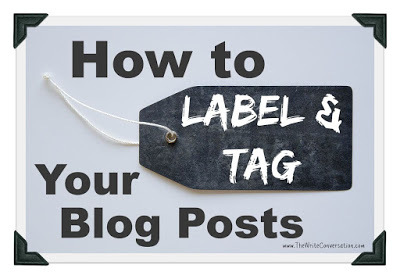 One thing every writer with a blog wants to know is this.
One thing every writer with a blog wants to know is this.
"How can I get my blog found?"
Of course there is no single answer—but one of the major part of the get-my-blog-found question is to learn how to label and tag your blog posts correctly.
When I give this answer, I get a lot of blank looks. This is one critical step a lot of blogger miss when posting a blog. Today, I’m going to give you the tools that make labeling/tagging a breeze and immediately help your blog move up in the search engine rankings.DefinitionsTags and Labels: these two mean the exact same things. It just depends on which blogging platform you use. Blogger: uses the term labels. Below is screenshot #1, showing you where to find the place to add LABELS on a blogger site.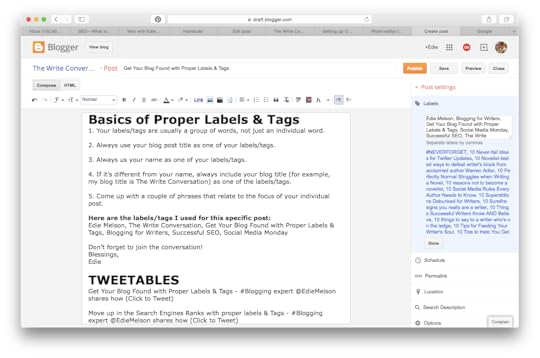 #1. Where to find LABELS in BloggerWordPress: uses the term tags. Below is screenshot #2, showing you where to find the place to add TAGS on a WordPress site.
#1. Where to find LABELS in BloggerWordPress: uses the term tags. Below is screenshot #2, showing you where to find the place to add TAGS on a WordPress site.
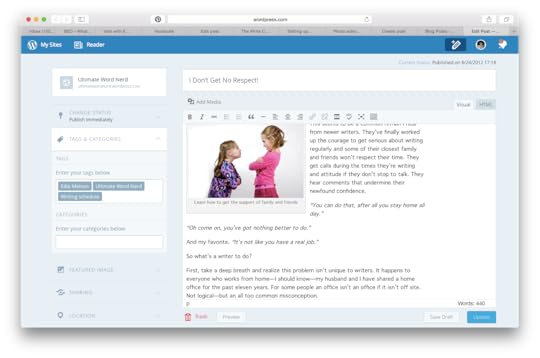 #2. Where to find TAGS in WordPress
#2. Where to find TAGS in WordPress
Even though successful tagging may seem like a complicated formula—one part magic and two parts luck—it’s more of a game and not nearly as difficult as you may think.
A keyword is like a label. It's a short way—although almost always more than one word in length—to state the purpose of your article. Articles can have several keyword groups or only one.
Targeted Labels/Tags make your posts easier to find when a topic is typed into a search engine. When your individual blog posts begin showing up in the top, it will drive up the visibility of your site.
The picture below is screenshot #3, of where my blog post about the 2015 Facebook changes showed up in a Google search. Just FYI, it's number 4 out of about 416,000,000. Not bad.
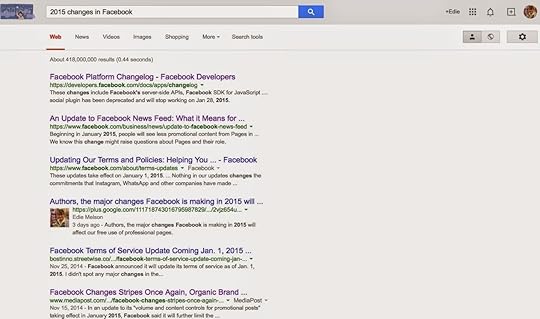

Warning, Brief Geek ContentTo understand how tagging can help your blog post get found (or lost in the sea of other blogs) you do have to understand a little about search engines. Search engines crawl the Internet searching and sorting all the information. In the simplest of terms, the more your information about and on your page matches up, the higher you rank.
Now, for those of you who truly understand search engines, you know this is way over simplifying the concept. Lots of other things come into count when your post is ranked, but tagging correctly will get you way on down the road!
Basics of Proper Labels & Tags1. Your labels/tags are usually a group of words, not just an individual word.
2. Always use your blog post title as one of your labels/tags.
3. Always us your name as one of your labels/tags.
4. If it’s different from your name, always include your blog title (for example, my blog title is The Write Conversation) as one of the labels/tags.
5. Come up with a couple of phrases that relate to the focus of your individual post.
Here are the labels/tags I used for this specific post:Edie Melson, The Write Conversation, How to Label and Tag Your blog Posts, Blogging for Writers, Writing Instruction, Social Media for Writers, Successful SEO, Social Media Monday
Don’t forget to join the conversation!Blessings,
Edie
TWEETABLESLearn how to Label & Tag your blog posts from #blogging expert @EdieMelson (Click to Tweet)
Get Your Blog Found with Proper Labels & Tags - via #Blogging expert @EdieMelson (Click to Tweet)
If you've missed the previous posts in this series, here are the direct links:
Blogging For Writers
Part 1 - Blog or Website, Which Does a Writer Really Need
Part 2 - So What Do I Blog About
Part 3 - The Dos & Don'ts of Blogging
 One thing every writer with a blog wants to know is this.
One thing every writer with a blog wants to know is this. "How can I get my blog found?"
Of course there is no single answer—but one of the major part of the get-my-blog-found question is to learn how to label and tag your blog posts correctly.
When I give this answer, I get a lot of blank looks. This is one critical step a lot of blogger miss when posting a blog. Today, I’m going to give you the tools that make labeling/tagging a breeze and immediately help your blog move up in the search engine rankings.DefinitionsTags and Labels: these two mean the exact same things. It just depends on which blogging platform you use. Blogger: uses the term labels. Below is screenshot #1, showing you where to find the place to add LABELS on a blogger site.
 #1. Where to find LABELS in BloggerWordPress: uses the term tags. Below is screenshot #2, showing you where to find the place to add TAGS on a WordPress site.
#1. Where to find LABELS in BloggerWordPress: uses the term tags. Below is screenshot #2, showing you where to find the place to add TAGS on a WordPress site.
 #2. Where to find TAGS in WordPress
#2. Where to find TAGS in WordPressEven though successful tagging may seem like a complicated formula—one part magic and two parts luck—it’s more of a game and not nearly as difficult as you may think.
A keyword is like a label. It's a short way—although almost always more than one word in length—to state the purpose of your article. Articles can have several keyword groups or only one.
Targeted Labels/Tags make your posts easier to find when a topic is typed into a search engine. When your individual blog posts begin showing up in the top, it will drive up the visibility of your site.
The picture below is screenshot #3, of where my blog post about the 2015 Facebook changes showed up in a Google search. Just FYI, it's number 4 out of about 416,000,000. Not bad.


Warning, Brief Geek ContentTo understand how tagging can help your blog post get found (or lost in the sea of other blogs) you do have to understand a little about search engines. Search engines crawl the Internet searching and sorting all the information. In the simplest of terms, the more your information about and on your page matches up, the higher you rank.
Now, for those of you who truly understand search engines, you know this is way over simplifying the concept. Lots of other things come into count when your post is ranked, but tagging correctly will get you way on down the road!
Basics of Proper Labels & Tags1. Your labels/tags are usually a group of words, not just an individual word.
2. Always use your blog post title as one of your labels/tags.
3. Always us your name as one of your labels/tags.
4. If it’s different from your name, always include your blog title (for example, my blog title is The Write Conversation) as one of the labels/tags.
5. Come up with a couple of phrases that relate to the focus of your individual post.
Here are the labels/tags I used for this specific post:Edie Melson, The Write Conversation, How to Label and Tag Your blog Posts, Blogging for Writers, Writing Instruction, Social Media for Writers, Successful SEO, Social Media Monday
Don’t forget to join the conversation!Blessings,
Edie
TWEETABLESLearn how to Label & Tag your blog posts from #blogging expert @EdieMelson (Click to Tweet)
Get Your Blog Found with Proper Labels & Tags - via #Blogging expert @EdieMelson (Click to Tweet)
If you've missed the previous posts in this series, here are the direct links:
Blogging For Writers
Part 1 - Blog or Website, Which Does a Writer Really Need
Part 2 - So What Do I Blog About
Part 3 - The Dos & Don'ts of Blogging
Published on September 21, 2015 01:00
September 20, 2015
Time to Refocus My Life
You do not want a sacrifice, or I would give it; You are not pleased with a burnt offering. Psalm 51:16
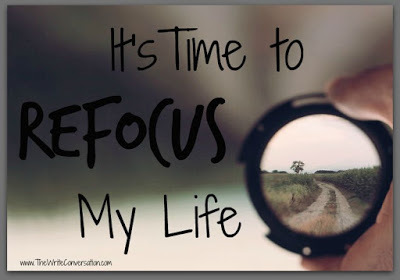 I don’t know about you, but I’m a doer. No matter how hard I try, I can’t seem to help myself. And while I have made some improvement over the years, unless I’m really focused, I’m going to judge my day, my progress, even my worth, on the things I’ve accomplished.
I don’t know about you, but I’m a doer. No matter how hard I try, I can’t seem to help myself. And while I have made some improvement over the years, unless I’m really focused, I’m going to judge my day, my progress, even my worth, on the things I’ve accomplished. I know in my head that a check mark by everything on my to do list isn’t synonymous for how good I’m doing. Unfortunately, I just can’t seem to get my feelings to switch over to this way of thinking. This unhealthy outlook permeates every part of my life, especially spiritually. I keep acting like I can win God’s favor by doing more.
And it's time to refocus my life.
Being a Christ-follower has its emphasis on the state of being verb, rather than an action verb.
God has always been more interested in the process rather than the product.
 To me, that means that statement reminds me that God is relationally, not task oriented. Whatever needs doing, He can do. He uses us to accomplish His will not to keep us busy or because He Himself doesn’t have the time. He allows us to join Him where He’s working because of the relationship.
To me, that means that statement reminds me that God is relationally, not task oriented. Whatever needs doing, He can do. He uses us to accomplish His will not to keep us busy or because He Himself doesn’t have the time. He allows us to join Him where He’s working because of the relationship.God wants to spend time with me. He wants me to be so familiar with His voice that I can instantly hear and respond when He calls my name. But when I fill my life with things I have to do, my focus drifts, as things and tasks capture my attention and draw me away from the relationship.
So once again, I’m readjusting my life. I’m looking at the person of God and making concrete plans to spend more time with Him, instead of for Him. Care to join me?
TWEETABLESpending time with God, instead of FOR God – readjusting life’s focus – via @EdieMelson (Click to Tweet)
Published on September 20, 2015 01:00
September 19, 2015
Autumn—My Favorite Time of Year
by Edie Melson @EdieMelson
Autumn is my favorite time of the year—the crisp air and beautiful colors pull me out of doors at every opportunity. What is your favorite part of the fall?
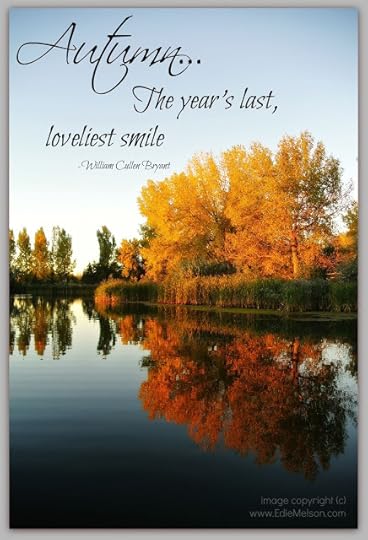 "Autumn . . . The year's last, loveliest smile." William Cullen BryantBe sure to share your thoughts in the comments section below.
"Autumn . . . The year's last, loveliest smile." William Cullen BryantBe sure to share your thoughts in the comments section below.
I invite you to use this image any way you like online. Post it to your blog, share it on Facebook, Twitter, Pinterest, anywhere you'd like. All I ask is that you keep it intact, with my website watermark visible.
Don't forget to join the conversation!Blessings,Edie
Autumn is my favorite time of the year—the crisp air and beautiful colors pull me out of doors at every opportunity. What is your favorite part of the fall?
 "Autumn . . . The year's last, loveliest smile." William Cullen BryantBe sure to share your thoughts in the comments section below.
"Autumn . . . The year's last, loveliest smile." William Cullen BryantBe sure to share your thoughts in the comments section below.I invite you to use this image any way you like online. Post it to your blog, share it on Facebook, Twitter, Pinterest, anywhere you'd like. All I ask is that you keep it intact, with my website watermark visible.
Don't forget to join the conversation!Blessings,Edie
Published on September 19, 2015 01:00
September 18, 2015
The Difference Between Science Fiction and Fantasy
by Edie Melson @EdieMelson
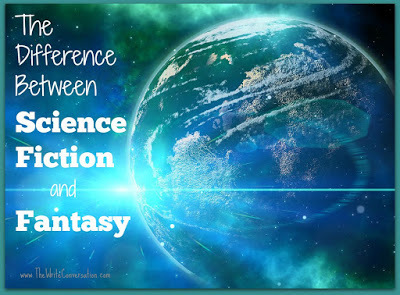 As we move into fall, a lot of us begin to anticipate upcoming movie releases. For those of us with geekish bent, we look forward to those like the new Star Wars. In honor of the movies to come, I’m going to share some insight into the difference between Fantasy and Science Fiction.
As we move into fall, a lot of us begin to anticipate upcoming movie releases. For those of us with geekish bent, we look forward to those like the new Star Wars. In honor of the movies to come, I’m going to share some insight into the difference between Fantasy and Science Fiction.Often times readers and writers will lump science fiction and fantasy together without realizing the difference. And in an attempt to differentiate, they’ll often come up with arbitrary rules about what makes something fantasy or scifi. Truthfully, there are very few books that mix the two.Here are some of the myths you may have heard:If it has dragons, it’s fantasy.Science fiction only deals with hard science.Epics are always fantasy.Science fiction deals with space wars.These are just a few of the ones I’ve been told.
The truth is they’re all wrong…and they’re all right. And none of them gives an accurately complete picture of the sub-genres.
The definitions aren’t as difficult as I may have led you to believe. But they both are determined by the world built by the author.
 Science fiction depends on a universe that is based in science. For instance, if the author has built a world where dragons have evolved or been genetically engineered, that is science fiction. A classic example of this is the Dragons of Pernseries by the late Anne McCaffrey. Her books are populated by dragons, fire lizards and the like. BUT, and this is an important distinction, these animals were genetically engineered. They do possess the ability to mind-link with their rides and breath fire. But it is all explained through science.
Science fiction depends on a universe that is based in science. For instance, if the author has built a world where dragons have evolved or been genetically engineered, that is science fiction. A classic example of this is the Dragons of Pernseries by the late Anne McCaffrey. Her books are populated by dragons, fire lizards and the like. BUT, and this is an important distinction, these animals were genetically engineered. They do possess the ability to mind-link with their rides and breath fire. But it is all explained through science.Fantasy has the one additional element of magic.
 The classic example of this is the Narnia books from C.S. Lewis. The worlds he built have dark magic and light magic. And things happen WITHOUT a scientific reason.
The classic example of this is the Narnia books from C.S. Lewis. The worlds he built have dark magic and light magic. And things happen WITHOUT a scientific reason.Both book series have dragons and creatures that we'd consider other-worldly. But one is explained by science and the other through the supernatural.
Now, I have a quiz for you all. I challenge you to name one science fiction story (or movie) and/or book, as well as one fantasy story (or movie) and/or book. AND to support your answers with these definitions.
If you disagree with my parameters, I’d love to hear from you, too. All in all, today should prove to be a spirited discussion and we’ll all learn something, as well as get some new books to put on our to-be-read lists!
Don’t forget to join the conversation!Blessings,Edie
TWEETABLESThe difference between #ScienceFiction & Fantasy - via @EdieMelson (Click to Tweet)
#ScienceFiction & Fantasy are different genres - tips to tell them apart @EdieMelson (Click to Tweet)
Published on September 18, 2015 01:00
September 17, 2015
When Weed Words Creep into Your Writing
By Cyle Young @CyleYoung
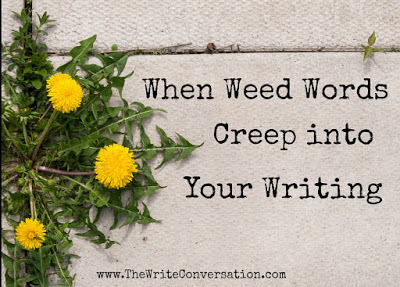 Have you ever read through your manuscript only to realize the same words keep popping up like weeds in a garden?
Have you ever read through your manuscript only to realize the same words keep popping up like weeds in a garden?
If your answer is yes, relax—we all do it.
In the flurry of keystrokes, some words just appear. You didn’t want them. You don’t remember thinking them. But nevertheless, they sprout like common weeds.
Your mind can often add unintentional words to your writing. Especially when you are rushed to meet a deadline, or when you are specifically trying to avoid writing certain words.
These words aren’t always bad. They can be used in your writing, but they frequently symbolize lazy thought. Feel free to use them sparingly
In modern day vernacular, these words fill up air space. A person speaks at around 140 words per minute and can only type on average around 40 words per minute. Our minds are accustomed to using extra words to communicate a thought or idea through speech. When we are writing we must weed out the extra words, which although they be acceptable in a spoken context, should not be included in concise writing.
 It is possible to weed out these words as you are writing your manuscript, but more than likely you will need to create custom searches to help you eradicate the weeds during your final edits.
It is possible to weed out these words as you are writing your manuscript, but more than likely you will need to create custom searches to help you eradicate the weeds during your final edits.
In many of the most popular writing software programs, such as Word, Pages, Scrivener, there are searches to find each use of a word and to quickly determine whether to replace or delete it.
Stylistically these words can and should be included in your characters dialogue. Most people in real life speak using weed words. If you want your characters to have vibrancy in their dialogue, utilize some of these weed word to help bring your characters to life. But don’t overdue it.
Not every character should use weed words in their speech. For example, a college professor should have a more dynamic vocabulary, and a small child should speak in simple one or two syllable words with a higher frequency of weed word usage.
Spend some time scouring through your manuscript to discover your own weed word vocabulary.
This list is far from exhaustive, but hopefully it will give you a place to begin. As you discover the weeds that sprout in your writing garden, add them to your own list. Just remember to also add them to your final editing process.
What are some of your weed words? Share in the comments below.
TWEETABLES
What to do when weed words creep into your #writing - @CyleYoung on @EdieMelson (Click to Tweet)
Word choice is vital for writers, watch out for weed words - @CyleYoung on @EdieMelson (Click to Tweet)
 Cyle Young is thankful God blessed him with the uniqueness of being an ADD-riddled…SQUIRREL!...binge writer. Not much unlike the classic video game Frogger, Cyle darts back and forth between various writing genres. He crafts princess children’s stories, how-to advice for parents, epic fantasy tales, and easy readers.
Cyle Young is thankful God blessed him with the uniqueness of being an ADD-riddled…SQUIRREL!...binge writer. Not much unlike the classic video game Frogger, Cyle darts back and forth between various writing genres. He crafts princess children’s stories, how-to advice for parents, epic fantasy tales, and easy readers.
 Have you ever read through your manuscript only to realize the same words keep popping up like weeds in a garden?
Have you ever read through your manuscript only to realize the same words keep popping up like weeds in a garden?If your answer is yes, relax—we all do it.
In the flurry of keystrokes, some words just appear. You didn’t want them. You don’t remember thinking them. But nevertheless, they sprout like common weeds.
Your mind can often add unintentional words to your writing. Especially when you are rushed to meet a deadline, or when you are specifically trying to avoid writing certain words.
These words aren’t always bad. They can be used in your writing, but they frequently symbolize lazy thought. Feel free to use them sparingly
In modern day vernacular, these words fill up air space. A person speaks at around 140 words per minute and can only type on average around 40 words per minute. Our minds are accustomed to using extra words to communicate a thought or idea through speech. When we are writing we must weed out the extra words, which although they be acceptable in a spoken context, should not be included in concise writing.
 It is possible to weed out these words as you are writing your manuscript, but more than likely you will need to create custom searches to help you eradicate the weeds during your final edits.
It is possible to weed out these words as you are writing your manuscript, but more than likely you will need to create custom searches to help you eradicate the weeds during your final edits.In many of the most popular writing software programs, such as Word, Pages, Scrivener, there are searches to find each use of a word and to quickly determine whether to replace or delete it.
Stylistically these words can and should be included in your characters dialogue. Most people in real life speak using weed words. If you want your characters to have vibrancy in their dialogue, utilize some of these weed word to help bring your characters to life. But don’t overdue it.
Not every character should use weed words in their speech. For example, a college professor should have a more dynamic vocabulary, and a small child should speak in simple one or two syllable words with a higher frequency of weed word usage.
Spend some time scouring through your manuscript to discover your own weed word vocabulary.
This list is far from exhaustive, but hopefully it will give you a place to begin. As you discover the weeds that sprout in your writing garden, add them to your own list. Just remember to also add them to your final editing process.
What are some of your weed words? Share in the comments below.
TWEETABLES
What to do when weed words creep into your #writing - @CyleYoung on @EdieMelson (Click to Tweet)
Word choice is vital for writers, watch out for weed words - @CyleYoung on @EdieMelson (Click to Tweet)
 Cyle Young is thankful God blessed him with the uniqueness of being an ADD-riddled…SQUIRREL!...binge writer. Not much unlike the classic video game Frogger, Cyle darts back and forth between various writing genres. He crafts princess children’s stories, how-to advice for parents, epic fantasy tales, and easy readers.
Cyle Young is thankful God blessed him with the uniqueness of being an ADD-riddled…SQUIRREL!...binge writer. Not much unlike the classic video game Frogger, Cyle darts back and forth between various writing genres. He crafts princess children’s stories, how-to advice for parents, epic fantasy tales, and easy readers.
Published on September 17, 2015 01:00
September 16, 2015
Define Your Audience—Who Are You Writing To?
by Katy Kauffman @KatyKauffman28
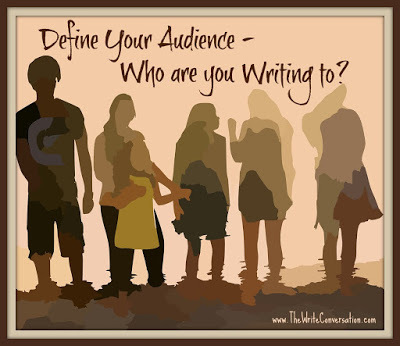 I thought of them as I wrote my first book—my best friend who has four children, another good friend who has survived trial after trial, and the women in a Sunday school I once belonged to.
I thought of them as I wrote my first book—my best friend who has four children, another good friend who has survived trial after trial, and the women in a Sunday school I once belonged to.
I wanted to remember their everyday struggles and concerns. I didn’t want to give pat answers or offer easy fixes. Remembering “real life” helped me as I wrote my first Bible study.
Who are you writing to?
When you sit at your desk and start to write, do you string words together to speak to a vague audience—those people whom you don’t know but hope will buy your book? Or do you write to people you know? To the people you love? When we identify the strengths, struggles, and concerns of the people we’re writing to—even specific people—it makes our writing richer. More personal. More “real.”
 Who are your writing to?I once asked Andy Andrews at a Women of Faith Conference whom he wrote to. I submitted my question on an index card, along with myriads of other women (and a few brave men), and I was surprised when my question was read on stage. It went something like this: Are there specific people you think of when you write your books? There were. Andy said that he thought of close family and friends as he wrote. I even think he said that he visualized their faces.
Who are your writing to?I once asked Andy Andrews at a Women of Faith Conference whom he wrote to. I submitted my question on an index card, along with myriads of other women (and a few brave men), and I was surprised when my question was read on stage. It went something like this: Are there specific people you think of when you write your books? There were. Andy said that he thought of close family and friends as he wrote. I even think he said that he visualized their faces.
We don’t write to an ethereal audience. We write to real people with real concerns. When you write a Bible study or devotional blog post, think of the faces of the people who mean the most to you. Think of what you would want to tell them to help them go through a difficult time or how you would encourage them to keep following God. Include the best material you can get from God in Bible study and prayer. Identify your target audience, and remember the needs and concerns they have as you write.
 Also include yourself as part of the
Also include yourself as part of the
audience in your books & blogs.Also include yourself as the audience in your books and blog posts. Very often we become the audience for our own books, as God teaches us and gives us principles for everyday living. The author is both writer and reader, recipient and teacher. As God encourages us, we can encourage others.
I’m not suggesting that we ever divulge someone’s personal information. Or that we name them in our book. Far from it! But the struggles we’ve gone through and the concerns we know that others face, can shape how we talk about our subject, so that we stay connected to reality, real needs, and real victories. Always remember to whom you are writing, and give real answers for real concerns of the heart. Those are the kinds of books and blog posts I like to read again and again.
When you write, do you ever visualize yourself talking to a particular friend or loved one? Do you have a particular audience that you write to—friends, young moms, business people, or teens? Share your thoughts below, and join the conversation!
TWEETABLES
Define your audience - who are you writing to? @KatyKauffman28 on @EdieMelson (Click to Tweet)
Focusing on your target audience makes your #writing stronger - @KatyKauffman28 (Click to Tweet)
Katy Kauffman is an award-winning writer and a co-founder of Lighthouse Bible Studies, a ministry which seeks to connect people to God through His Word. She has taught the Bible to women and teens, and has two published Bible studies for women, 2 Timothy: Winning the Victory and Faith, Courage, and Victory. Her heart’s desire is for women to know and love God, understand the richness of His Word, and fulfill His plan for their lives. Katy is also the designer of Broken but Priceless: The Magazine. She makes her home near Atlanta, Georgia. Connect with her further on Facebook and Twitter.
 I thought of them as I wrote my first book—my best friend who has four children, another good friend who has survived trial after trial, and the women in a Sunday school I once belonged to.
I thought of them as I wrote my first book—my best friend who has four children, another good friend who has survived trial after trial, and the women in a Sunday school I once belonged to. I wanted to remember their everyday struggles and concerns. I didn’t want to give pat answers or offer easy fixes. Remembering “real life” helped me as I wrote my first Bible study.
Who are you writing to?
When you sit at your desk and start to write, do you string words together to speak to a vague audience—those people whom you don’t know but hope will buy your book? Or do you write to people you know? To the people you love? When we identify the strengths, struggles, and concerns of the people we’re writing to—even specific people—it makes our writing richer. More personal. More “real.”
 Who are your writing to?I once asked Andy Andrews at a Women of Faith Conference whom he wrote to. I submitted my question on an index card, along with myriads of other women (and a few brave men), and I was surprised when my question was read on stage. It went something like this: Are there specific people you think of when you write your books? There were. Andy said that he thought of close family and friends as he wrote. I even think he said that he visualized their faces.
Who are your writing to?I once asked Andy Andrews at a Women of Faith Conference whom he wrote to. I submitted my question on an index card, along with myriads of other women (and a few brave men), and I was surprised when my question was read on stage. It went something like this: Are there specific people you think of when you write your books? There were. Andy said that he thought of close family and friends as he wrote. I even think he said that he visualized their faces.We don’t write to an ethereal audience. We write to real people with real concerns. When you write a Bible study or devotional blog post, think of the faces of the people who mean the most to you. Think of what you would want to tell them to help them go through a difficult time or how you would encourage them to keep following God. Include the best material you can get from God in Bible study and prayer. Identify your target audience, and remember the needs and concerns they have as you write.
 Also include yourself as part of the
Also include yourself as part of theaudience in your books & blogs.Also include yourself as the audience in your books and blog posts. Very often we become the audience for our own books, as God teaches us and gives us principles for everyday living. The author is both writer and reader, recipient and teacher. As God encourages us, we can encourage others.
I’m not suggesting that we ever divulge someone’s personal information. Or that we name them in our book. Far from it! But the struggles we’ve gone through and the concerns we know that others face, can shape how we talk about our subject, so that we stay connected to reality, real needs, and real victories. Always remember to whom you are writing, and give real answers for real concerns of the heart. Those are the kinds of books and blog posts I like to read again and again.
When you write, do you ever visualize yourself talking to a particular friend or loved one? Do you have a particular audience that you write to—friends, young moms, business people, or teens? Share your thoughts below, and join the conversation!
TWEETABLES
Define your audience - who are you writing to? @KatyKauffman28 on @EdieMelson (Click to Tweet)
Focusing on your target audience makes your #writing stronger - @KatyKauffman28 (Click to Tweet)
Katy Kauffman is an award-winning writer and a co-founder of Lighthouse Bible Studies, a ministry which seeks to connect people to God through His Word. She has taught the Bible to women and teens, and has two published Bible studies for women, 2 Timothy: Winning the Victory and Faith, Courage, and Victory. Her heart’s desire is for women to know and love God, understand the richness of His Word, and fulfill His plan for their lives. Katy is also the designer of Broken but Priceless: The Magazine. She makes her home near Atlanta, Georgia. Connect with her further on Facebook and Twitter.
Published on September 16, 2015 01:00
September 15, 2015
Tips to Help Meet Your Writing Deadlines
By Lucinda Secrest McDowell @LucindaSMcDowel
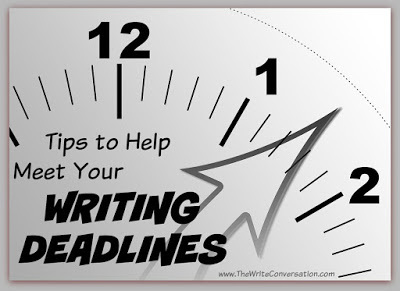 This week I submitted the manuscript for my twelfth book. On time. Whew!
This week I submitted the manuscript for my twelfth book. On time. Whew!
Because it was contracted late in the season, and I had already made several travel plans that could not be cancelled, I wondered if I could do it.
Through God’s grace, prayer support, diligent hard work, good health, and a strategy I will share, I made it!In fact, I have never missed a writing deadline.
This is not to brag, just to say that as a professional writer, I take contracts seriously and my writing even more seriously. But I don’t take myself too seriously.
When I commit to write a book, an article or guest blog, I am plugging into the intricate scheduling of someone else – a publishing house, a magazine or a website. They are counting on receiving my work and they, too, have committed to me that it will be published.
 If I fail to follow through in a timely and appropriate manner, my actions could set in motion unfortunate consequences that might reflect poorly on my integrity and their house.
If I fail to follow through in a timely and appropriate manner, my actions could set in motion unfortunate consequences that might reflect poorly on my integrity and their house.
This is the part of a writer’s life that you don’t want to hear. You may be thinking that I am haughty, judgmental or lacking grace. I assure you, this is not the truth. I live every day dependent on God’s grace in my life and I offer it freely to others.
One day I may need to ask a publisher for an extension of a deadline, due to an emergency or illness or crisis. And, believe me, I will do so! There are many circumstances in life that are simply beyond our control. And my professional exception is that “family trumps everything.” So, yes, sometimes we have to negotiate a new deadline.
A few years ago, a publisher invited me to write another Bible Study for them and I was so honored that they had liked the first three I had written, that I immediately said “Yes!” After outlining the new book, but before I had actually signed the contract, I realized my decision had been precipitous. My two daughters were getting married within six months of each other and I wanted to be totally free to focus on our family. So I contacted the publisher, who was most understanding, and suggested several other suitable authors for that study. In fact, the one who ended up writing it was brilliant. I felt a tinge of embarrassment, but knew I had chosen rightly.
However, running late due to my own choices is something altogether different.
Here is my strategy for meeting deadlines:Think carefully and prayerfully about the deadline date which has been proposed. For this book, I had to ask for a date change in the contract, but one that would still enable the publisher to get the book out on schedule. To compromise, I told them I would submit the first half of the book halfway through so they could begin editing. It worked.Pray. I cannot emphasize this enough. Write down your prayer for this project, your concerns, your hopes and dreams. The names of the people you know that will take your words and make them into a book, or help it get into readers’ hands. Pray for those who must live with you at this time. Enlist your family, friends or Bible Study group to pray for you and keep them informed on your progress. Construct a dedicated calendar for the project, starting now and ending on the due date. First write in everything that is non-negotiable – work times, trips scheduled that cannot be changed, children’s recitals etc. I also marked down one night a week as a date with my husband, and one night weekly with my special needs adult son. Now look at the spaces of writing time. This is what you have to work with, so plan wisely.Divide your project into chapters or sections and begin filling in those spaces. Do not neglect the early time of research which often takes longer than you expect. Also, give yourself ‘recovery’ spaces after a trip or event because you will need to settle back in and gear up for the project. Every day try to meet your goal. If you don’t meet your goal that day, try to catch up or redo your calendar.Research. Outline. Write the book. Rewrite the book. Edit. Rewrite the book. Confirm details on all the footnotes (this book had 284 citations). Write the back pages. Read over and Submit!There will be more –much more –before your words become a book. The editor at your publishing house will send you edits and you may be crushed by what they deleted or added. But you will confer with them and together you will produce a better read. The graphic designers will create a cover and inside design which I hope you will love, or at least choose to embrace graciously.
Construct a dedicated calendar for the project, starting now and ending on the due date. First write in everything that is non-negotiable – work times, trips scheduled that cannot be changed, children’s recitals etc. I also marked down one night a week as a date with my husband, and one night weekly with my special needs adult son. Now look at the spaces of writing time. This is what you have to work with, so plan wisely.Divide your project into chapters or sections and begin filling in those spaces. Do not neglect the early time of research which often takes longer than you expect. Also, give yourself ‘recovery’ spaces after a trip or event because you will need to settle back in and gear up for the project. Every day try to meet your goal. If you don’t meet your goal that day, try to catch up or redo your calendar.Research. Outline. Write the book. Rewrite the book. Edit. Rewrite the book. Confirm details on all the footnotes (this book had 284 citations). Write the back pages. Read over and Submit!There will be more –much more –before your words become a book. The editor at your publishing house will send you edits and you may be crushed by what they deleted or added. But you will confer with them and together you will produce a better read. The graphic designers will create a cover and inside design which I hope you will love, or at least choose to embrace graciously.
But you will have done your part. Writing is work. It is not a hobby. I loved writing my book this summer – “Dwelling Places – Words to Live in Every Season” – because I delight in exploring the words from God’s Word. And because I have a passion to share how to live in God’s presence and peace.
It was a joy to write. But it was work. Please know I write this blog with all humility, utterly grateful to God’s grace and mercy that I met my deadline. It seems to be a miracle each time I do. May my suggestions help you as well.
TWEETABLES
Tips to Help Meet Your #Writing Deadline - @LucindaSMcDowel on @EdieMelson (Click to Tweet)
Meeting #writing deadlines is about more than just calendar considerations - @LucindaSMcDowel (Click to Tweet)
 Lucinda Secrest McDowell, M.T.S., is the author of 11 books, contributing author to 25 books, and has published in more than 50 magazines. A graduate of Gordon-Conwell Theological Seminary and Furman University, she studied at the Wheaton Graduate School of Communication and served as Communications Specialist for the Lausanne Committee for World Evangelization (Thailand) and Editor for Billy Graham’s International Conference for Itinerant Evangelists (Netherlands). A member of Advanced Writers and Speakers Association (AWSA), she has received “Writer of the Year” awards from both Mt. Hermon and Blue Ridge Writers Conferences. Cindy speaks internationally through her ministry “Encouraging Words” and co-directs the New England Christian Writers Retreat. Known for her ability to convey deep truth in practical and winsome ways, she writes from “Sunnyside” cottage in New England. Visit her online at www.EncouragingWords.net
Lucinda Secrest McDowell, M.T.S., is the author of 11 books, contributing author to 25 books, and has published in more than 50 magazines. A graduate of Gordon-Conwell Theological Seminary and Furman University, she studied at the Wheaton Graduate School of Communication and served as Communications Specialist for the Lausanne Committee for World Evangelization (Thailand) and Editor for Billy Graham’s International Conference for Itinerant Evangelists (Netherlands). A member of Advanced Writers and Speakers Association (AWSA), she has received “Writer of the Year” awards from both Mt. Hermon and Blue Ridge Writers Conferences. Cindy speaks internationally through her ministry “Encouraging Words” and co-directs the New England Christian Writers Retreat. Known for her ability to convey deep truth in practical and winsome ways, she writes from “Sunnyside” cottage in New England. Visit her online at www.EncouragingWords.net
Links www.NewEnglandChristianWritersRetreat.comBlog/website www.EncouragingWords.net
 This week I submitted the manuscript for my twelfth book. On time. Whew!
This week I submitted the manuscript for my twelfth book. On time. Whew!Because it was contracted late in the season, and I had already made several travel plans that could not be cancelled, I wondered if I could do it.
Through God’s grace, prayer support, diligent hard work, good health, and a strategy I will share, I made it!In fact, I have never missed a writing deadline.
This is not to brag, just to say that as a professional writer, I take contracts seriously and my writing even more seriously. But I don’t take myself too seriously.
When I commit to write a book, an article or guest blog, I am plugging into the intricate scheduling of someone else – a publishing house, a magazine or a website. They are counting on receiving my work and they, too, have committed to me that it will be published.
 If I fail to follow through in a timely and appropriate manner, my actions could set in motion unfortunate consequences that might reflect poorly on my integrity and their house.
If I fail to follow through in a timely and appropriate manner, my actions could set in motion unfortunate consequences that might reflect poorly on my integrity and their house.This is the part of a writer’s life that you don’t want to hear. You may be thinking that I am haughty, judgmental or lacking grace. I assure you, this is not the truth. I live every day dependent on God’s grace in my life and I offer it freely to others.
One day I may need to ask a publisher for an extension of a deadline, due to an emergency or illness or crisis. And, believe me, I will do so! There are many circumstances in life that are simply beyond our control. And my professional exception is that “family trumps everything.” So, yes, sometimes we have to negotiate a new deadline.
A few years ago, a publisher invited me to write another Bible Study for them and I was so honored that they had liked the first three I had written, that I immediately said “Yes!” After outlining the new book, but before I had actually signed the contract, I realized my decision had been precipitous. My two daughters were getting married within six months of each other and I wanted to be totally free to focus on our family. So I contacted the publisher, who was most understanding, and suggested several other suitable authors for that study. In fact, the one who ended up writing it was brilliant. I felt a tinge of embarrassment, but knew I had chosen rightly.
However, running late due to my own choices is something altogether different.
Here is my strategy for meeting deadlines:Think carefully and prayerfully about the deadline date which has been proposed. For this book, I had to ask for a date change in the contract, but one that would still enable the publisher to get the book out on schedule. To compromise, I told them I would submit the first half of the book halfway through so they could begin editing. It worked.Pray. I cannot emphasize this enough. Write down your prayer for this project, your concerns, your hopes and dreams. The names of the people you know that will take your words and make them into a book, or help it get into readers’ hands. Pray for those who must live with you at this time. Enlist your family, friends or Bible Study group to pray for you and keep them informed on your progress.
 Construct a dedicated calendar for the project, starting now and ending on the due date. First write in everything that is non-negotiable – work times, trips scheduled that cannot be changed, children’s recitals etc. I also marked down one night a week as a date with my husband, and one night weekly with my special needs adult son. Now look at the spaces of writing time. This is what you have to work with, so plan wisely.Divide your project into chapters or sections and begin filling in those spaces. Do not neglect the early time of research which often takes longer than you expect. Also, give yourself ‘recovery’ spaces after a trip or event because you will need to settle back in and gear up for the project. Every day try to meet your goal. If you don’t meet your goal that day, try to catch up or redo your calendar.Research. Outline. Write the book. Rewrite the book. Edit. Rewrite the book. Confirm details on all the footnotes (this book had 284 citations). Write the back pages. Read over and Submit!There will be more –much more –before your words become a book. The editor at your publishing house will send you edits and you may be crushed by what they deleted or added. But you will confer with them and together you will produce a better read. The graphic designers will create a cover and inside design which I hope you will love, or at least choose to embrace graciously.
Construct a dedicated calendar for the project, starting now and ending on the due date. First write in everything that is non-negotiable – work times, trips scheduled that cannot be changed, children’s recitals etc. I also marked down one night a week as a date with my husband, and one night weekly with my special needs adult son. Now look at the spaces of writing time. This is what you have to work with, so plan wisely.Divide your project into chapters or sections and begin filling in those spaces. Do not neglect the early time of research which often takes longer than you expect. Also, give yourself ‘recovery’ spaces after a trip or event because you will need to settle back in and gear up for the project. Every day try to meet your goal. If you don’t meet your goal that day, try to catch up or redo your calendar.Research. Outline. Write the book. Rewrite the book. Edit. Rewrite the book. Confirm details on all the footnotes (this book had 284 citations). Write the back pages. Read over and Submit!There will be more –much more –before your words become a book. The editor at your publishing house will send you edits and you may be crushed by what they deleted or added. But you will confer with them and together you will produce a better read. The graphic designers will create a cover and inside design which I hope you will love, or at least choose to embrace graciously. But you will have done your part. Writing is work. It is not a hobby. I loved writing my book this summer – “Dwelling Places – Words to Live in Every Season” – because I delight in exploring the words from God’s Word. And because I have a passion to share how to live in God’s presence and peace.
It was a joy to write. But it was work. Please know I write this blog with all humility, utterly grateful to God’s grace and mercy that I met my deadline. It seems to be a miracle each time I do. May my suggestions help you as well.
TWEETABLES
Tips to Help Meet Your #Writing Deadline - @LucindaSMcDowel on @EdieMelson (Click to Tweet)
Meeting #writing deadlines is about more than just calendar considerations - @LucindaSMcDowel (Click to Tweet)
 Lucinda Secrest McDowell, M.T.S., is the author of 11 books, contributing author to 25 books, and has published in more than 50 magazines. A graduate of Gordon-Conwell Theological Seminary and Furman University, she studied at the Wheaton Graduate School of Communication and served as Communications Specialist for the Lausanne Committee for World Evangelization (Thailand) and Editor for Billy Graham’s International Conference for Itinerant Evangelists (Netherlands). A member of Advanced Writers and Speakers Association (AWSA), she has received “Writer of the Year” awards from both Mt. Hermon and Blue Ridge Writers Conferences. Cindy speaks internationally through her ministry “Encouraging Words” and co-directs the New England Christian Writers Retreat. Known for her ability to convey deep truth in practical and winsome ways, she writes from “Sunnyside” cottage in New England. Visit her online at www.EncouragingWords.net
Lucinda Secrest McDowell, M.T.S., is the author of 11 books, contributing author to 25 books, and has published in more than 50 magazines. A graduate of Gordon-Conwell Theological Seminary and Furman University, she studied at the Wheaton Graduate School of Communication and served as Communications Specialist for the Lausanne Committee for World Evangelization (Thailand) and Editor for Billy Graham’s International Conference for Itinerant Evangelists (Netherlands). A member of Advanced Writers and Speakers Association (AWSA), she has received “Writer of the Year” awards from both Mt. Hermon and Blue Ridge Writers Conferences. Cindy speaks internationally through her ministry “Encouraging Words” and co-directs the New England Christian Writers Retreat. Known for her ability to convey deep truth in practical and winsome ways, she writes from “Sunnyside” cottage in New England. Visit her online at www.EncouragingWords.net Links www.NewEnglandChristianWritersRetreat.comBlog/website www.EncouragingWords.net
Published on September 15, 2015 01:00
September 14, 2015
The Dos & Don'ts of Blogging—Blogging for Writers, Part Three
by Edie Melson @EdieMelson
 Dos & Don'ts of Blogging
Dos & Don'ts of Blogging
I love to blog, and I try to share my love of blogging when I teach at writing conferences.
I also know that many of you aren’t such fans. Many try to love blogging because it’s a good way to connect with readers and build an online presence. Others, don’t even try to love it, but do it out of necessity. The rest are like me, and enjoy the process as well as the connections it brings.
No matter where you are with blogging, it’s important to do it well. Whether you blog twice a month on a group blog, or daily on your own site, there are some essential dos and don’ts of blogging that I’d like to share today.
Blogging is a great way to build relationships with our audience.
But a lot of people forget that, just like building relationship in person, it’s never a good idea to talk so much that others don’t have a chance to share their thoughts.
I often visit blogs where I want to ask the reader, “Are you blogging or lecturing?” There are things we can do to make sure our posts encourage conversation. And there are things we can do that discourage interaction.
The Dos of Blogging End EVERY blog post with an open-
End EVERY blog post with an open-
ended question.End every blog post with an open-ended question. It’s not enough to ask a question at the end of the post. We must make sure the answer to the question isn’t just yes or no.Make sure the question posed doesn’t have an assumed right or wrong answer. This will shut down conversation even faster than a yes or no question. If we ask a question that has a definite right or wrong answer, very few people will be willing to risk the wrong answer. And after several have answered the question correctly, we’ll find no one else is answering because they feel like everything that needs to be said has been said.Ask readers to share an experience that relates to the post. Sometimes a blog post won’t lend itself to a question. In those instances we can encourage our audience to share their experience.Ask readers to add to a list of suggestions or tips that have been shared. I do that a lot on here. (And I’ll do it at the end of this post.) Again, if a question isn’t appropriate or feel right, ask them to contribute to the topic already introduced. Avoid using the pronoun you whenever possible.Avoid using the pronoun you whenever possible. This is especially true if the post is pointing out something negative. Using the word you carries a finger-pointing connotation that we want to avoid. For example, in the point above, I would never say, “you must make sure the answer to the question isn’t just yes or no.” Instead, I phrased it, “We must make sure the answer to the question isn’t just yes or no.” Share your own personal experience. If we’re asking someone else to share, we need to make sure our blogs are a safe place for that. Going first rarely feels safe. So I always try to make sure I share my own experience before asking my readers to share theirs.Always try to answer blog comments. This doesn’t mean every single comment has to be answered individually, although I do try to do that. It’s important that your readers don’t feel like they’re commenting to nobody.Do Keep a Schedule: I’ve said it before and I’ll continue to say it until the day I die. If we expect our readers to come back regularly, we must be dependable. How often would you visit a business if you never knew whether or not it would be open? If we don’t have a new post up when we say we will, it’s like we’re not open for business.Do Include Social Media Links in Your Sidebar: Don’t miss out on valuable connections on other networks just because you’ve forgotten to add social media links to your blog.Do Use Proper Formatting & Images: This means utilize bold headings, bullet points, and images to illustrate your posts. Proper formatting will break up the text and make the blog easier to be read. Make your post scannable. This proves your post’s value and makes it more likely to be read.
Avoid using the pronoun you whenever possible.Avoid using the pronoun you whenever possible. This is especially true if the post is pointing out something negative. Using the word you carries a finger-pointing connotation that we want to avoid. For example, in the point above, I would never say, “you must make sure the answer to the question isn’t just yes or no.” Instead, I phrased it, “We must make sure the answer to the question isn’t just yes or no.” Share your own personal experience. If we’re asking someone else to share, we need to make sure our blogs are a safe place for that. Going first rarely feels safe. So I always try to make sure I share my own experience before asking my readers to share theirs.Always try to answer blog comments. This doesn’t mean every single comment has to be answered individually, although I do try to do that. It’s important that your readers don’t feel like they’re commenting to nobody.Do Keep a Schedule: I’ve said it before and I’ll continue to say it until the day I die. If we expect our readers to come back regularly, we must be dependable. How often would you visit a business if you never knew whether or not it would be open? If we don’t have a new post up when we say we will, it’s like we’re not open for business.Do Include Social Media Links in Your Sidebar: Don’t miss out on valuable connections on other networks just because you’ve forgotten to add social media links to your blog.Do Use Proper Formatting & Images: This means utilize bold headings, bullet points, and images to illustrate your posts. Proper formatting will break up the text and make the blog easier to be read. Make your post scannable. This proves your post’s value and makes it more likely to be read.
The Don’ts of Blogging Don’t Make Your Post too Long: The ideal post length is between 500-700 words. Any longer and it’s much less likely to be read. Yes, there are exceptions. But those exceptions are just that, and many bloggers I talk to think they're the exception but they aren’t. It’s a hard truth, but shorter posts will up the engagement and readership of 98% of the blogs out there.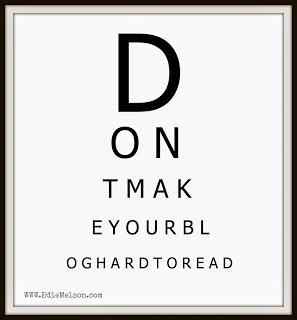 Don't Make Your Blog Hard to Read!Don’t Make Your Blog Hard to Read:Make sure the font used is a sans-serif font, like the one used here, which is VERDANA. As opposed to a serif font, like this one: Times New Roman. Also make sure your font is large enough to be easily read. Finally, be careful which colors you choose for your blog.Don’t Use Vague Titles for Blog Posts: Our audience will judge our posts on the expectations we set in the titles we choose. Also, social media is often a world without context. Use this question when choosing a title: If someone were to only read the title, would they know what the post was about? If the answer’s no, then choose another title.Don’t Clutter Your Blog’s Sidebar: The sidebar of our blogs should be organized in the order of importance. If the most important thing to you is having people sign up for updates for your blog, then email and RSS signups should be at the top of your sidebar. If it’s hard for people to find your sign up or your social media links, you’re missing out on building your online audience.Remember the main purpose of blogging is building relationships.
Don't Make Your Blog Hard to Read!Don’t Make Your Blog Hard to Read:Make sure the font used is a sans-serif font, like the one used here, which is VERDANA. As opposed to a serif font, like this one: Times New Roman. Also make sure your font is large enough to be easily read. Finally, be careful which colors you choose for your blog.Don’t Use Vague Titles for Blog Posts: Our audience will judge our posts on the expectations we set in the titles we choose. Also, social media is often a world without context. Use this question when choosing a title: If someone were to only read the title, would they know what the post was about? If the answer’s no, then choose another title.Don’t Clutter Your Blog’s Sidebar: The sidebar of our blogs should be organized in the order of importance. If the most important thing to you is having people sign up for updates for your blog, then email and RSS signups should be at the top of your sidebar. If it’s hard for people to find your sign up or your social media links, you’re missing out on building your online audience.Remember the main purpose of blogging is building relationships.
 It's our job to make visitors feel welcome.To build those relationships, we have to be good hosts when it comes to our blogs and make our readers fee welcome. We have to make it a place where people want to visit and want join the conversation.
It's our job to make visitors feel welcome.To build those relationships, we have to be good hosts when it comes to our blogs and make our readers fee welcome. We have to make it a place where people want to visit and want join the conversation.
What makes you feel welcome when you visit a blog? What turns you off? Be sure to leave your thoughts in the comments section below.
Don't forget to join the conversation!Blessings,Edie
TWEETABLESThe Dos & Don'ts of #Blogging for Writers & Speakers - @EdieMelson (Click to Tweet)
The main purpose of #blogging is is building relationships - tips from @EdieMelson (Click to Tweet)
If you've missed the previous posts in this series, here are the direct links:
Blogging For Writers
Part 1 - Blog or Website, Which Does a Writer Really Need
Part 2 - So What Do I Blog About
 Dos & Don'ts of Blogging
Dos & Don'ts of BloggingI love to blog, and I try to share my love of blogging when I teach at writing conferences.
I also know that many of you aren’t such fans. Many try to love blogging because it’s a good way to connect with readers and build an online presence. Others, don’t even try to love it, but do it out of necessity. The rest are like me, and enjoy the process as well as the connections it brings.
No matter where you are with blogging, it’s important to do it well. Whether you blog twice a month on a group blog, or daily on your own site, there are some essential dos and don’ts of blogging that I’d like to share today.
Blogging is a great way to build relationships with our audience.
But a lot of people forget that, just like building relationship in person, it’s never a good idea to talk so much that others don’t have a chance to share their thoughts.
I often visit blogs where I want to ask the reader, “Are you blogging or lecturing?” There are things we can do to make sure our posts encourage conversation. And there are things we can do that discourage interaction.
The Dos of Blogging
 End EVERY blog post with an open-
End EVERY blog post with an open-ended question.End every blog post with an open-ended question. It’s not enough to ask a question at the end of the post. We must make sure the answer to the question isn’t just yes or no.Make sure the question posed doesn’t have an assumed right or wrong answer. This will shut down conversation even faster than a yes or no question. If we ask a question that has a definite right or wrong answer, very few people will be willing to risk the wrong answer. And after several have answered the question correctly, we’ll find no one else is answering because they feel like everything that needs to be said has been said.Ask readers to share an experience that relates to the post. Sometimes a blog post won’t lend itself to a question. In those instances we can encourage our audience to share their experience.Ask readers to add to a list of suggestions or tips that have been shared. I do that a lot on here. (And I’ll do it at the end of this post.) Again, if a question isn’t appropriate or feel right, ask them to contribute to the topic already introduced.
 Avoid using the pronoun you whenever possible.Avoid using the pronoun you whenever possible. This is especially true if the post is pointing out something negative. Using the word you carries a finger-pointing connotation that we want to avoid. For example, in the point above, I would never say, “you must make sure the answer to the question isn’t just yes or no.” Instead, I phrased it, “We must make sure the answer to the question isn’t just yes or no.” Share your own personal experience. If we’re asking someone else to share, we need to make sure our blogs are a safe place for that. Going first rarely feels safe. So I always try to make sure I share my own experience before asking my readers to share theirs.Always try to answer blog comments. This doesn’t mean every single comment has to be answered individually, although I do try to do that. It’s important that your readers don’t feel like they’re commenting to nobody.Do Keep a Schedule: I’ve said it before and I’ll continue to say it until the day I die. If we expect our readers to come back regularly, we must be dependable. How often would you visit a business if you never knew whether or not it would be open? If we don’t have a new post up when we say we will, it’s like we’re not open for business.Do Include Social Media Links in Your Sidebar: Don’t miss out on valuable connections on other networks just because you’ve forgotten to add social media links to your blog.Do Use Proper Formatting & Images: This means utilize bold headings, bullet points, and images to illustrate your posts. Proper formatting will break up the text and make the blog easier to be read. Make your post scannable. This proves your post’s value and makes it more likely to be read.
Avoid using the pronoun you whenever possible.Avoid using the pronoun you whenever possible. This is especially true if the post is pointing out something negative. Using the word you carries a finger-pointing connotation that we want to avoid. For example, in the point above, I would never say, “you must make sure the answer to the question isn’t just yes or no.” Instead, I phrased it, “We must make sure the answer to the question isn’t just yes or no.” Share your own personal experience. If we’re asking someone else to share, we need to make sure our blogs are a safe place for that. Going first rarely feels safe. So I always try to make sure I share my own experience before asking my readers to share theirs.Always try to answer blog comments. This doesn’t mean every single comment has to be answered individually, although I do try to do that. It’s important that your readers don’t feel like they’re commenting to nobody.Do Keep a Schedule: I’ve said it before and I’ll continue to say it until the day I die. If we expect our readers to come back regularly, we must be dependable. How often would you visit a business if you never knew whether or not it would be open? If we don’t have a new post up when we say we will, it’s like we’re not open for business.Do Include Social Media Links in Your Sidebar: Don’t miss out on valuable connections on other networks just because you’ve forgotten to add social media links to your blog.Do Use Proper Formatting & Images: This means utilize bold headings, bullet points, and images to illustrate your posts. Proper formatting will break up the text and make the blog easier to be read. Make your post scannable. This proves your post’s value and makes it more likely to be read. The Don’ts of Blogging Don’t Make Your Post too Long: The ideal post length is between 500-700 words. Any longer and it’s much less likely to be read. Yes, there are exceptions. But those exceptions are just that, and many bloggers I talk to think they're the exception but they aren’t. It’s a hard truth, but shorter posts will up the engagement and readership of 98% of the blogs out there.
 Don't Make Your Blog Hard to Read!Don’t Make Your Blog Hard to Read:Make sure the font used is a sans-serif font, like the one used here, which is VERDANA. As opposed to a serif font, like this one: Times New Roman. Also make sure your font is large enough to be easily read. Finally, be careful which colors you choose for your blog.Don’t Use Vague Titles for Blog Posts: Our audience will judge our posts on the expectations we set in the titles we choose. Also, social media is often a world without context. Use this question when choosing a title: If someone were to only read the title, would they know what the post was about? If the answer’s no, then choose another title.Don’t Clutter Your Blog’s Sidebar: The sidebar of our blogs should be organized in the order of importance. If the most important thing to you is having people sign up for updates for your blog, then email and RSS signups should be at the top of your sidebar. If it’s hard for people to find your sign up or your social media links, you’re missing out on building your online audience.Remember the main purpose of blogging is building relationships.
Don't Make Your Blog Hard to Read!Don’t Make Your Blog Hard to Read:Make sure the font used is a sans-serif font, like the one used here, which is VERDANA. As opposed to a serif font, like this one: Times New Roman. Also make sure your font is large enough to be easily read. Finally, be careful which colors you choose for your blog.Don’t Use Vague Titles for Blog Posts: Our audience will judge our posts on the expectations we set in the titles we choose. Also, social media is often a world without context. Use this question when choosing a title: If someone were to only read the title, would they know what the post was about? If the answer’s no, then choose another title.Don’t Clutter Your Blog’s Sidebar: The sidebar of our blogs should be organized in the order of importance. If the most important thing to you is having people sign up for updates for your blog, then email and RSS signups should be at the top of your sidebar. If it’s hard for people to find your sign up or your social media links, you’re missing out on building your online audience.Remember the main purpose of blogging is building relationships.  It's our job to make visitors feel welcome.To build those relationships, we have to be good hosts when it comes to our blogs and make our readers fee welcome. We have to make it a place where people want to visit and want join the conversation.
It's our job to make visitors feel welcome.To build those relationships, we have to be good hosts when it comes to our blogs and make our readers fee welcome. We have to make it a place where people want to visit and want join the conversation. What makes you feel welcome when you visit a blog? What turns you off? Be sure to leave your thoughts in the comments section below.
Don't forget to join the conversation!Blessings,Edie
TWEETABLESThe Dos & Don'ts of #Blogging for Writers & Speakers - @EdieMelson (Click to Tweet)
The main purpose of #blogging is is building relationships - tips from @EdieMelson (Click to Tweet)
If you've missed the previous posts in this series, here are the direct links:
Blogging For Writers
Part 1 - Blog or Website, Which Does a Writer Really Need
Part 2 - So What Do I Blog About
Published on September 14, 2015 01:00



